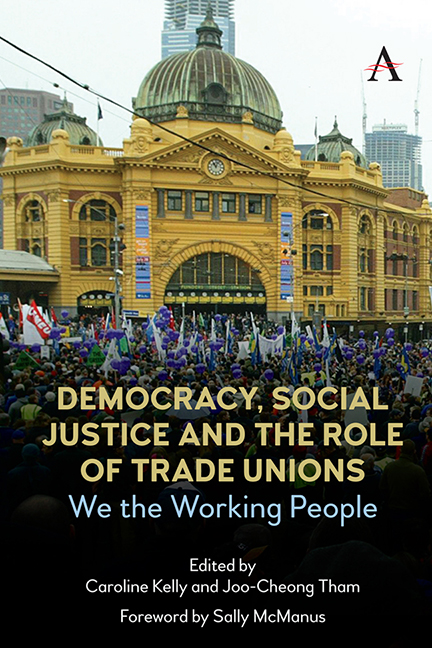Book contents
- Frontmatter
- Contents
- Foreword
- Acknowledgements
- Chapter 1 Democracy and Social Justice as Organising Principles
- Chapter 2 Economic Democracy, Workers and Unions
- Chapter 3 Nobody Owns the Future
- Chapter 4 Regulatory Approaches to the Internal Affairs of Trade Unions in Australia: From Democratic Control to Corporate Accountability
- Chapter 5 Trade Unions and the Regulation of Election Funding: Between Libertarianism and Egalitarianism
- Chapter 6 Trade Unions and Precarious Work: In Search of Effective Strategies
- Chapter 7 ‘Is There an App for That?’ Worker Representation, Unions and the Gig Economy
- Chapter 8 Temporary Migrant Workers and Trade Unions in Australia: A Complex Relationship
- Chapter 9 Unions, Fossil Fuel Exports and a Just Transition
- Chapter 10 Trade Agreements, Labour Rights and Democracy
- Chapter 11 Trade Unions, Labour Law and Democratic Socialism: The COVID-19 Crisis in the United Kingdom
- Notes on Contributors
- Index
Chapter 6 - Trade Unions and Precarious Work: In Search of Effective Strategies
Published online by Cambridge University Press: 18 November 2021
- Frontmatter
- Contents
- Foreword
- Acknowledgements
- Chapter 1 Democracy and Social Justice as Organising Principles
- Chapter 2 Economic Democracy, Workers and Unions
- Chapter 3 Nobody Owns the Future
- Chapter 4 Regulatory Approaches to the Internal Affairs of Trade Unions in Australia: From Democratic Control to Corporate Accountability
- Chapter 5 Trade Unions and the Regulation of Election Funding: Between Libertarianism and Egalitarianism
- Chapter 6 Trade Unions and Precarious Work: In Search of Effective Strategies
- Chapter 7 ‘Is There an App for That?’ Worker Representation, Unions and the Gig Economy
- Chapter 8 Temporary Migrant Workers and Trade Unions in Australia: A Complex Relationship
- Chapter 9 Unions, Fossil Fuel Exports and a Just Transition
- Chapter 10 Trade Agreements, Labour Rights and Democracy
- Chapter 11 Trade Unions, Labour Law and Democratic Socialism: The COVID-19 Crisis in the United Kingdom
- Notes on Contributors
- Index
Summary
Trade unions in Australia, as in many other industrialised societies, are facing a major challenge as a result of the expansion of precarious work. How unions respond will be crucial both for precarious workers and for the future of unions.
Precarious work, also called ‘insecure work’ or ‘bad jobs’, is best understood as work that exhibits precariousness or insecurity across all or most characteristics of a job. One useful definition refers to (1) lack of regulatory protection; (2) low wages; (3) high employment insecurity; and (4) low levels of employee control over wages, hours and working conditions. Scholars rightly caution that precarious work should not be identified just with non-standard employment, since precariousness can also emerge within standard full-time permanent employment. Nevertheless, it is true that precariousness tends to be concentrated in certain non-standard forms of employment. In Australia, this would include forms of self-employment such as freelancing, but it mainly concerns forms of wage labour such as casual work, fixed-term employment, temporary agency work (‘labour-hire’), bogus self-employment (including much ‘platform work’) and even part-time permanent employment. The list includes several highly commodified forms of work, new and old, and their recent proliferation highlights the continuing relevance of the principle announced in the opening passage of the ILO Declaration of Philadelphia: ‘labour is not a commodity’.
One pitfall in discussing this topic should be flagged at the start. From a union point of view, it is vital to keep in mind a distinction between precarious work and precarious workers. The distinction is not always hard and fast, but it is an essential heuristic device. It is the key to avoiding dangerous errors of conflation, whereby (1) hostility to the work is taken to imply hostility to the worker currently in that form of work; or (2) a positive approach to the worker is taken to imply a positive approach to the work. Instead, effective union strategy may require different approaches for the work and for the worker. For example, zero-hours work arrangements may need to be proscribed, but action to achieve a prohibition can be compatible with, and may indeed demand, organisation of zero-hours workers and representation of their interests.
- Type
- Chapter
- Information
- Democracy, Social Justice and the Role of Trade UnionsWe the Working People, pp. 93 - 118Publisher: Anthem PressPrint publication year: 2021



